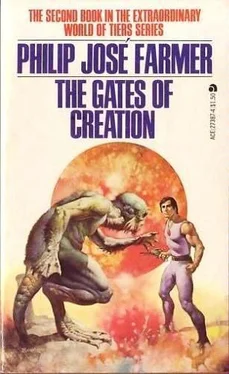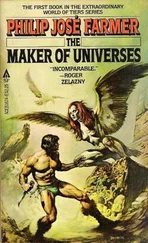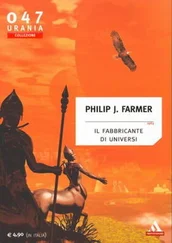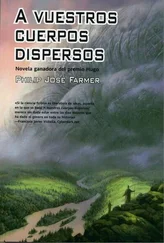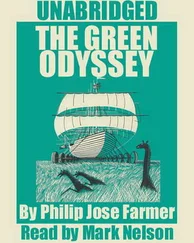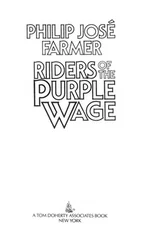Tharmas said, “Perhaps… well, this is not the most desirable of worlds. But it is better to enjoy life here than to die or live in pain in one of Urizen’s cells. Why not forget that gate? There is food and water here and native women. Let Urizen sit in his seat of power forever and rot waiting for us to come to him.”
“You forget that, without your drugs, you will get old and will die,” Wolff said. “Do you want that? Moreover, there is no guarantee that Urizen will not come to us if we don’t go to him. No, you may sit here in a lotus-eater’s dream if you want, but I intend to keep fighting.”
“You see, Tharmas,” Vala said, smiling crookedly. “Jadawin has stronger reasons than we do. His woman—who is not a Lord, by the way, but an inferior breed from Earth—is a prisoner of Urizen’s. He cannot rest while he knows she is in our father’s hands.”
“It’s up to you to do what you want,” Wolff said. “But I am my own master.”
He studied the red heavens, the two huge-seeming planets that were in sight at this tune, and a tiny streak that could have been a black comet. He said, “Why go through the front door, where Urizen expects us? Why not sneak through the back door? Or, a better metaphor, through a window?”
In answer to their questions, he explained the idea that had come to him when he looked at the other planets and the comet. They replied that he was crazy. His concepts were too fantastic.
“Why not?” he said. “As I’ve said, everything we need can be gotten, even if we have to go through the gates again. And Appirmatzum is only twenty thousand miles away. Why can’t we get there with the ship I proposed?”
“A balloon spacecraft?” Rintrah said. “Jadawin, your life on Earth has addled your wits!”
“I need the help of every one of you,” Wolfi said. “It’s an undertaking of large magnitude and complexity. It’ll take tremendous labors and a long time. But it can be done.”
Vala said, “Even if it can be accomplished, what’s to prevent our father from detecting our craft as it comes through the space between this world and his?”
“We’ll have to take the chance that he’s not set up detectors for spacecraft. Why should he? The only entrance to this universe is through the gate that he made himself.”
“But what if one of us is a traitor?” she said. “Have you thought that one of us may be in Urizen’s service and so spying for him?”
“Of course I’ve considered that. So has every one else. However, I can’t see a traitor putting himself through the extreme dangers that we just went through.”
“And how do we know that Urizen is not seeing and hearing everything right now?” Theotormon said.
“We don’t. That’s another chance well have to take.”
“It’s better than doing nothing,” Vala said.
There was much argument after that with all the Lords finally agreeing to help him in his plan. Even the objectors knew that if Wolff succeeded, those who refused to aid him would be marooned on this island. The thought that their brothers might be true Lords again while the objectors would be no better than the natives was too much for them.
The first thing Wolff did was to find out the temper of the neighboring natives. To his surprise, he found that they were not hostile. They had seen the Lords disappear into the gate and then come out again. Only the gods or demigods could do this; therefore, the Lords must be special—and dangerous—creatures. The natives were more than happy to cooperate with Wolff. Their religion, a debased form of the Lords’ original religion, determined this decision. They believed in Los as the good God and in Urizen as the evil one, their version of Satan. Their prophets and medicine men maintained that some day the evil one, Urizen, would be overthrown. When that happened, they would all go to Alulos, their heaven.
Wolff did not try to set them straight on the facts. Let them believe what they wished as long as they helped him. He set everybody to work on the things that could be done immediately and with materials available on this world. Then, he went through the gate that led to the other planets. Luvah went with him. Both were buoyed up by gas-bladders strapped to their backs and armed with short spears and bows and arrows. Through gate after gate they traveled, searching for the things that Wolff needed. They knew what to expect and what dangers to avoid. Even so, the adventures they met on this trip and the many trips thereafter were enough to have filled several books. But there were no more casualties.
Later, Vala and Rintrah accompanied Wolff and Luvah. They brought back chunks of the vitreous stuff from the world of the skating and suction-pad animals. From the Weltthier, they brought back piles of bird-droppings. These, added to the store of their own and the natives’ excrement, were to provide the sodium nitrate crystals in Wolff’s plan.
The mercury was gotten from the natives, who had large supplies picked up from the island after the showers that came with the black comets. The mercury droplets were religious objects and were given to Wolff only after he argued that they were to be used against Urizen. He discovered that one of the plants on the island was a source of wood alcohol. Other plants could be burned to give the charcoal he needed. And the planet of the tempusfudgers furnished sulphur.
Wolff had to have a platinum catalyst in the making of nitric acid. While on the cylinders of the birling world, he had thought that the cylinders might be composed of platinum or of a platinum alloy. This metal had a melting point of 1773.5 Centigrade and was resistant to cutting. Wolff had no means to melt it in the birling world or any tools sharp enough to cut out chunks from a cylinder. Luvah pointed this out, to which Wolff replied that they would use Urizen’s own devices for the job.
He took all the Lords with him, even though Theotormon and Tharmas strongly objected. They cornered the mobile twin gates and then pulled them to the edge of the cylinder. Here Theotormon found out why it was necessary for him to make the trip. His weight was needed to force the gates halfway down over the arc of the edge of the cylinder. The forces that kept the gates upright were strong but could not resist the combined weight and muscles of the Lords.
A portion of the arc went through one of the gates. Had the gate been held motionless, the piece of the cylinder would merely have projected through its matching gate on another cylinder. But when the gate was pulled sidewise along the edge, something had to give. The gate acted like a shears and cut off the part which went through the frame.
After setting the gate upright, the Lords went through it to the next cylinder, where they found a chunk of the platinum. And they used the next gate to cut the chunk into smaller pieces.
On the cylinder of the whirling death-gate, Wolff tested it with several stones. As soon as a stone disappeared, he marked the safe side with a dab of yellow paint brought from the waterworld. Thereafter, they had no trouble distinguishing the death-side from the safe side.
Wolff had the gates that could be moved in the various worlds transported to a more advantageous location.
The island on the waterworld became one vast forge of smoke and stink. The Lords and the natives complained mightily. Wolff listened, scoffed, laughed, or threatened, as the occasion demanded. He drove them on. Three hundred and sixty dark moons passed. The work was slow, disappointing many times, and often dangerous. Wolff and Luvah kept on making trips through the gates, bringing back from the still perilous circuit the materials they needed.
By this time the balloon spacecraft was half-built. When finished, it would ascend with the Lords until it rose above the atmosphere. Here the pseudogravity field weakened rapidly—if Theotormon was to be believed—and the craft would use the drag of the dark moon to pick up more speed. Then blackpowder rockets would give it more velocity. And steering would be done through small explosions of power or through release of gas-jets from bladders.
Читать дальше
